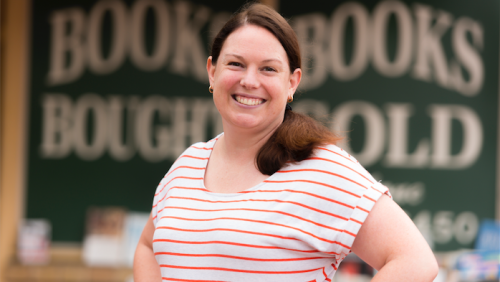
AFTER experiencing an extreme trauma reaction in 2009 while working as a social worker at child protection services, Kristen Holzapfel suffered an eating disorder.
She slowly recovered and published a book, “Selfless”, about her experiences in a bid to support other helpers.
As part of her recovery, Kristen says she fell into pet sitting and it became animal therapy for her.
“The animals were just so patient with me and I remember spending an hour just lying there stroking a dog’s tummy. It was so enormously therapeutic,” she says.
Kristen says that pet sitting came about at the point where she realised she couldn’t go back to work the traditional nine-to-five in an office anymore.
“Because my trauma was a work issue, the work itself was a trigger for me,” she says.
“I haven’t successfully returned to the workplace and the money I’ve lost through the payment adds up to an astronomical amount – I’m living on poverty-line wages now. But I’m happy.”
Kristen says she wanted to tell her story as a way to help other support workers.
“We need to make changes – it’s so hard for people who have experienced trauma as a helper to get compensation,” she says.
“I personally experienced a nasty trauma reaction, which came on very suddenly but was the result of long-time exposure to a lot of heady issues.
“I responded by not eating, which started overnight, and it didn’t fit my preconceived ideas of what trauma looked like. I didn’t think people my age experienced eating disorders, I thought it was the domain of teenage girls. And it wasn’t a body image thing at all, it was about control.
“Initially, I had no appetite because I was so focused on something else. The issues at work were never resolved, so there wasn’t a moment where I could say: ‘Okay, I feel safe now, I can start eating again’. It was prolonged and I never really went back to eating properly. Food became associated with fear and I thought I could somehow keep myself safe by not eating.”
Kristen says her weight dropped drastically after that, but says that no one at work stepped in or noticed.
“Everyone’s so busy and they don’t have time for problems or big challenging things, but it was a cry for help from me,” Kristen says.
“I was hoping that I was part of an organisation where I felt supported, but I felt really uneasy. I worried that I’d come unstuck and that it made me a risk to my clients.”
Kristen says she found it very hard to leave, particularly without having another stable job to go to.
“I wanted a smooth transition to another job, but it was hard and I spiralled down again and lost more weight, I was yellowy pale, not keeping up with conversations, I was malnourished and I wasn’t well. I was admitted to hospital for three weeks in 2009.”
Writing “Selfless” was tough, she says, but she pushed through it because she recognised that it was hard to find any stories like her own.
“There seemed to be a lot of stories out there about trauma and PTSD but they tend to be military focused,” she says.
“There’s so many more that come under that banner of emergency responders. Not just fire, police and ambulance, but domestic violence crisis workers, sexual assault counsellors, child protection officers. I think most people would agree they offer a 24-hour crisis service and they also respond in emergency situations. And yet there isn’t the same recognition and support for what they do. They’re not resourced in the same way and I really hope we can improve the support that’s available to our helping professionals because if we don’t, there’s dire consequences.
“First they’re going to leave so we will have a smaller pool of experienced helpers and also having a smaller pool of people who aren’t so good at what they do means we have less resources for the most vulnerable people in our society.
“It affects all of us, and we need to make sure that our helpers, in particular our front-line workers, are being supported better than they are.”
Kristen says she has experienced symptoms including anxiety, chronic nightmares and fear of places or situations that may trigger her.
“Writing the book was so enormously hard because it forced me to go to places I didn’t want to go. But finishing it was one of the most liberating things – there were no more secrets. This is who I am, this is how I experienced it, and it’s out there.”
Kristen says that she’s been technically homeless for the last two years or so, living out of her van and travelling from house to house to stay with pets when their owners go on holiday. However, she is planning to move into an apartment and is looking forward to having her own small space.
“I felt I should go in the direction my heart was telling me, which was spending time with animals – an integral part of my recovery,” she says.
“It’s been hard to start a small business but I’ve learned so much in the process and, as hard as it can be, I know I’m in the right place.”
“Selfless” is available at kholzapfel.com, Kristen’s new website that includes self-care tips and support resources
Who can be trusted?
In a world of spin and confusion, there’s never been a more important time to support independent journalism in Canberra.
If you trust our work online and want to enforce the power of independent voices, I invite you to make a small contribution.
Every dollar of support is invested back into our journalism to help keep citynews.com.au strong and free.
Thank you,
Ian Meikle, editor




Leave a Reply